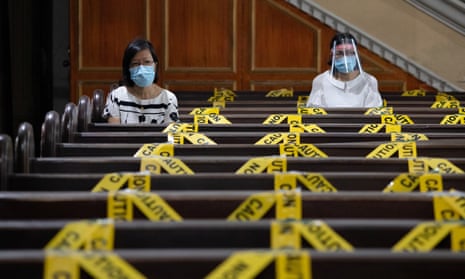Children in the Philippines will not attend school until a vaccine to protect against Covid-19 becomes available, officials confirmed, prompting fears millions of students could be left without access to education.
Scientists around the world are racing to develop a vaccine for Covid-19, but most experts caution that it will take at least a year or two for one to become available.
On Monday, Philippines education secretary Leonor Briones said online or TV classes would resume at the end of August, but there were concerns that children from the poorest or most remote communities, who do not have internet access, will miss out.
The country recently eased a strictly enforced quarantine that had been in place for more than two months, despite hundreds of new cases continuing to emerge daily. The lockdown has succeeded in slowing transmission, but it has also devastated the economy, and left millions of people work and in need of urgent social assistance.
Restrictions on movement remain in place, including for children, who are generally not allowed outside their homes unless they are going out to get essentials or going to work.
On Monday, 579 new infections were announced in the Philippines, bringing total cases to 22,474 cases. So far, 1,011 fatalities have been recorded.
The total number of known global cases of coronavirus was 7,119,454, with 406,540 deaths worldwide, according to Johns Hopkins University. The World Health Organisation (WHO) warned on Monday that the pandemic was worsening.
Governments have pledged billions of dollars to fund research into Covid-19, with teams across the world focused on developing vaccines and therapies. One of the contenders is the British-Swedish pharmaceutical company AstraZeneca, which said last week that it is “on track” to begin rolling out a vaccine in September if ongoing trials prove successful.
Most scientists have predicted that a vaccine is likely to take longer, but there is hope that antiviral therapies could emerge more quickly. In the UK, five new drugs are being trialled in 30 hospitals in an effort to find a treatment.
On Sunday, it was reported that AstraZeneca may be close to a breakthrough on an antibody treatment that could save the lives of people in the early stages of infection.
Across the world, governments are grappling with how to reopen schools without causing a surge in transmission. Children can be infected with the virus, according to the WHO, though there are relatively few cases of Covid-19 reported among children.
A number of countries have resumed face-to-face classes, including France, Vietnam, Australia and New Zealand. South Korea, however, was forced to delay the reopening of schools late last month following a surge in case.
In Indonesia’s capital Jakarta, officials allowed businesses to reopen this week, but schools will remain closed for the next month.
Offices, restaurants and grocery stores reopened with a reduced number of employees and customers present, as the country seeks to reopen its economy. On Friday, mosques and all other places of worship were also allowed to reopen at half capacity and with social-distancing requirements in place.
Public transportation also resumed with limits on passenger numbers on Monday, causing long queues at train stations.
The reopening of the capital comes just days after Indonesia reported a recorded daily spike of 993 cases, and amid concerns the virus is continuing to spread across the country.
Indonesia has recorded 31,186 infections, mostly in Jakarta and East Java, though on Monday officials in Bali reported an increase in local transmissions on the island.
Bali governor, I Wayan Koster, reported 25 news cases on Sunday, including one imported case, and raised alarms over a lack of awareness among residents. The government’s official tally suggested 12 new cases were confirmed in Bali on Monday, the Jakarta Post reported, bringing the total number of infections to 594. Inconsistencies in data, and delays in testing, have proved a challenge in monitoring the outbreak.
Across Indonesia, there have been 31,186 confirmed infections and 1,851 fatalities.
In other coronavirus developments:
New Zealand awoke to the lifting of all restrictions except border controls on Tuesday.
Australia recorded no locally transmitted cases of Covid-19 on Tuesday.
Brazil now has reported 707,412 cases and deaths have risen to 37,134. It marks a continuing steep rise.
Mexico reported 2,999 new cases on Monday and 354 deaths.
